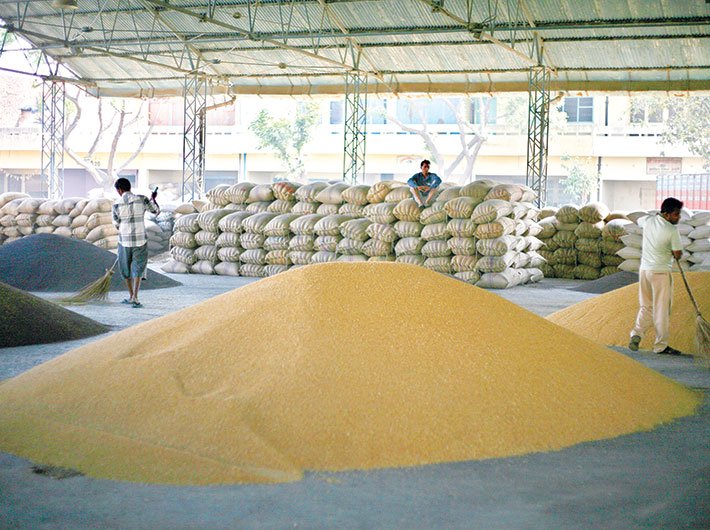The National Agricultural Market or e-NAM scheme was launched in April 2016 with the aim of eliminating middlemen, who make wild profits while farmers make a pittance. By trading on the online platform, farmers would be able to sell their produce across locations, seeking out the best payers. But two years on, the scheme is in a shambles.
There is very little information forthcoming from the Small Farmers’ Agribusiness Consortium (SFAC) as well as the union agriculture ministry. A joint secretary said he isn’t authorised to speak. Based on visits to mandis in Uttar Pradesh, and based on interviews with experts, here’s an analysis of what has gone wrong.
Farmers don’t know about it
The major problem why e-NAM is not succeeding is lack of awareness among farmers. Besides, they come to believe rumours spread by the middlemen. Mandis observe the 14th of every month as e-NAM day. Vans are sent to villages to promote the scheme and motivate farmers but the results are not satisfying.
Gajendra Tyagi, Mandi Sachiv, Dadri Mandi, says, “There is a lack of awareness among farmers about the scheme. Small farmers are still not aware of the scheme.”
Echoing those views, Satyapal Gangwar, Mandi Sachiv, Ghaziabad Mandi, Govindpuram, says, “Despite several efforts by mandis, farmers are not interested in signing up for the scheme. They are misguided by middlemen that if they accept the money of their produce in their accounts then the government will keep track of their income and impose a tax.”
Poor infrastructure
“There’s hardly any infrastructure to implement schemes such as e-NAM. Mandis haven’t improved; rather, due to staff-shortage, things have become worse. Mandis are not for farmers,” says a mandi staffer.
Governance Now visited three agriculture produce markets (mandis) -- in Dadri, Ghaziabad and Hapur, where the scheme seemed to be up and running on paper but implementation on the ground was nil. A staffer at the Meerut mandi says the scheme was launched in a hurry, but infrastructure is still not in place. Mandis still don’t have the promised assaying labs. Where they have been set up, there’s no trained staff.
No price discovery
“I think the major problem is that the scheme does not provide the right price to farmers,” says Devinder Sharma, an agriculture expert. “There’s no price discovery in e-NAM.”
He explains that it’s all fine that everything is happening electronically, through an online platform, but if farmers are not getting the minimum support price (MSP), how do they benefit?
What e-NAM offers, he says, is a model price – the average of the day’s trading. The e-NAM platform may have been meant for farmers, but it ends up favouring traders. Farmers get MSP only for two commodities, wheat and rice, which are procured by the government. But for 22 other commodities, they don’t get it.
Heavy chains
Implementation of e-NAM was assigned to the Small Farmers Agribusiness Consortium (SFAC), registered as a society of the department of agriculture, cooperation and farmers welfare (DAC&FW), under the union ministry of agriculture and farmers welfare. SFAC in turn chose to have a strategic partner: the tender went to M/s Nagarjuna Fertilisers and Chemicals Ltd (NFCL). SFAC would implement and manage the e-NAM portal, as well as NFCL’s iKisan portal, created in 1999 to help farmers through information technology. NFCL would get the software written, customise it to the needs of mandis in states that choose to join the e-NAM platform.
There was further outsourcing: for example, in Uttar Pradesh, the Uttar Pradesh Development Systems Corporation Ltd (UPDESCO) was given charge to hire mandi staff. This was further outsourced to BSN Infotech, Lucknow.
The process is slow and sluggish.
Staff shortage
In all three mandis Governance Now visited, officials complained of staff shortage. Sometimes, they say, agencies provide staff, but they are untrained.
The seriousness of UPDESCO as well as BSN Infotech is visible on their websites. UPDESCO has not mentioned e-NAM in their section for major projects, while there are 25 vacancies posted on the website of BSN Infotech but none of the vacancies are for mandis or e-NAM.
The staff shortage is being attributed to low pay. A computer operator is paid RS 7,500 per month, which gets delayed by four to five months. However, the agency that supplies the staff gets RS 14,000 per candidate per month.
Tyagi says, “For the success of the scheme it is important to have skilled manpower which will be available at adequate salary. Currently, the people recruited for e-NAM are not trained, hence the implementation suffers. Apart from this, due to less salary and that too not on time they are hardly motivated for the work assigned to them.”
What will it take for the scheme to take off?
Sharma suggested that if the government wants the scheme to become a game-changer, it should make it mandatory that everything traded in e-NAM shouldn’t be below MSP. Unless farmers gain, e-NAM will mean nothing to them. The government, he said, should make it mandatory for all traders to register and buy only via e-NAM. n
rahultrivedi@governancenow.com
(This issue article in the January 31, 2019 edition)

